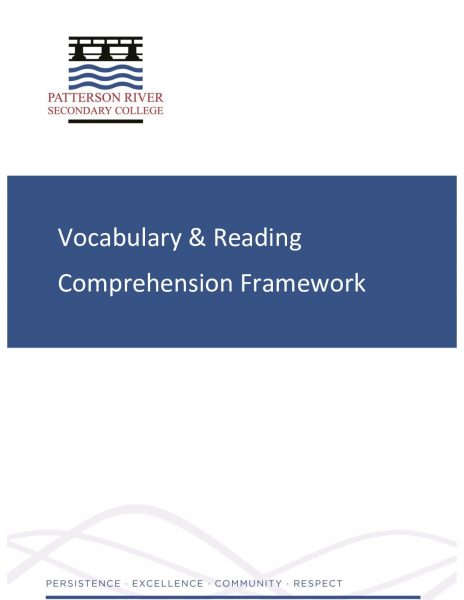Vocabulary & Reading Comprehension Framework
At Patterson River Secondary College we believe all teachers are teachers of Literacy. To support our teachers to develop their skills in literacy instruction, we have developed our own Vocabulary and Reading Comprehension Framework. We have also dedicated time to train all staff in best practice vocabulary instruction and the nine reading comprehension strategies outlined in the Framework.
In combining these two aspects of learning and teaching (Vocabulary Knowledge and Reading Comprehension) into one Framework, it is expected that students will be able to understand how vocabulary knowledge and reading comprehension skills underpins improvement in learning in all areas.
Vocabulary
Vocabulary consists of the words we understand when we hear or read them (receptive vocabulary) as well as the words we speak or write (expressive vocabulary). Students build vocabulary through interaction within their environments or through explicit instruction from their teachers. Students with a large and frequently-used vocabulary are more likely to be successful in their educational and vocational pursuits.
To support students to develop their vocabulary, teachers in each Learning Domain at the College are responsible for the development of Golden words/Key terms lists that relate to the pathways that the Domain offers. In Years 7-10 these are informed by the Victorian Curriculum and in Years 11-12 these are informed by the key knowledge and competencies articulated in the relevant VCE study designs and VCAL curriculum planning guides. This guarantees that roughly 25 content words are learnt at each year level in each learning area as students progress through their schooling.
Dependent upon the context, teachers use a range of evidence based vocabulary instruction activities to:
- Build background knowledge
- Teach words that are critical to comprehension
- Provide support during reading and writing
- Develop a conceptual framework for themes, topics and units of study
- Assess students’ understanding of words and concepts.
Reading comprehension
Teachers use the following nine reading comprehension strategies to support students to make meaning from the information they encounter:
- Predicting
- Questioning
- Monitoring
- Determining importance
- Summarising
- Activating and connecting
- Synthesising
- Visualising
- Inferring.
Our framework allows students to bring their knowledge of the strategies with them from Primary School and apply it across the broad range of learning contexts and information they encounter in Secondary School.
To read the complete PRSC Vocabulary and Reading Comprehension Framework please see the below document.

